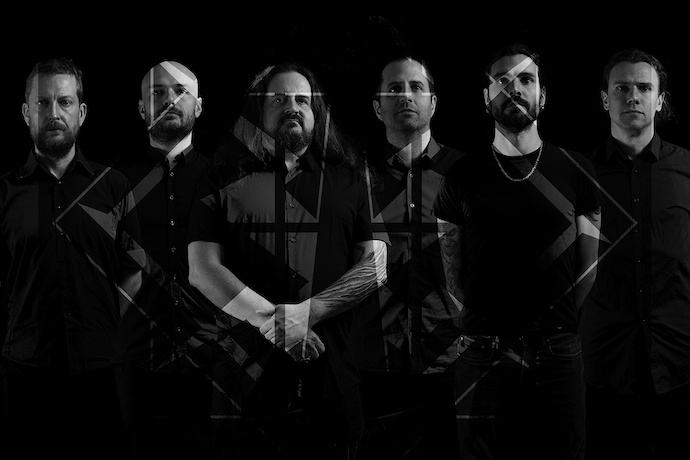
(On November 25th the French band Monolithe released Kosmodrom, their latest album in a 20-year career, and in this new interview we present Comrade Aleks‘ discussion with Monolithe multi-instrumentalist Sylvain Bégot.)
Monolithe went their long way from sci-fi influenced funeral doom metal with a unique approach and to their own original melodic death-doom from outer space. Their reputation at first was built around the Monolithe triptych (The Great Clockmaker concept) where each of this series of albums consisted of one huge epic track. The band developed their ideas further and made a step out of funeral doom territories with the next albums.
The lineup is remarkably large, as their masterplan demands a careful and individual approach where each of the band’s members plays his role: Sylvain Bégot (guitars), Benoît Blin (guitars), Olivier Defives (bass), Thibault Faucher (drums), Matthieu Marchand (keyboards), and Rémi Brochard (vocals, guitars).
The new Monolithe album Kosmodrom is a 67-minute-long journey to the brave past of the Soviet Space Program, the times of healthy competitions and high hopes which seem to be lost for us nowadays. This story was told with the universal tongue of death-doom, but some of its parts demand explanations, and Monolithe’s keeper Sylvain Bégot is the one who knows all the secrets behind it.
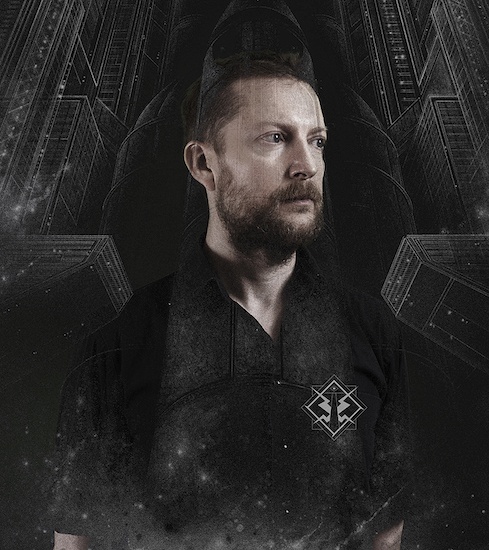
Hi Sylvain! And thanks for your time! What’s happening in Monolithe’s shadow? How busy are you now with the promotion of Monolithe’s new album?
Hi Aleks. You’re welcome. Actually, promotion is starting just now so we haven’t been that busy with it so far, though it will change in the near future I guess. We wanted to start it closer to the album release than is usually done, because we didn’t want the album to leak too early, like happened with our previous album.
Really? Did you find how it happened? And did it influence the album’s sale directly?
From what I know it leaked from either a magazine or webzine in the Netherlands. But can’t be sure. It spreads so fast once it’s online… Actually I’m not against the music being available online; it’s part of the game and it’s been this way for a long time. The problem is mostly when the album leaks much too early before the album release and also when the audio quality of the leak is utter shit. It can affect the sales a little bit, yes. But we weren’t lucky with this album, Okta Khora, as it was released just when covid started and that was the major obstacle to the promotion of this album, not the leak.
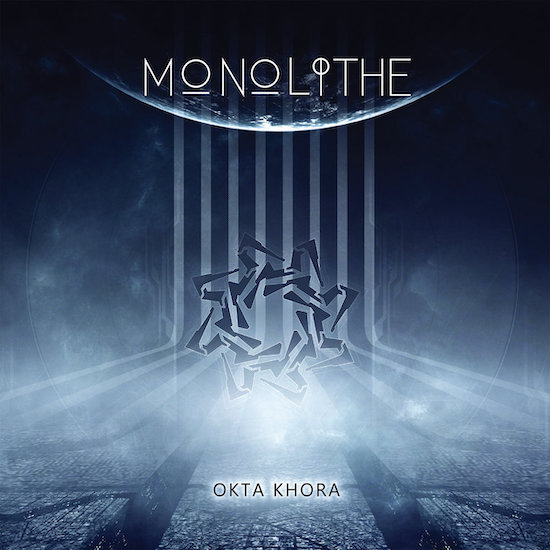
Do you think what in the end Okta Khora was understood and appreciated by Monolithe’s followers?
If I make a judgement from the feedback we got, I’d say that yes, it was. I think our core fanbase loved the album and we also reached some new people who thought we were playing something entirely different, as many medias still call us “Funeral Doom”, which is pretty inaccurate, right?
Damn right!
But overall, because of the reasons stated above, this album didn’t do very well sales-wise but it has been a winner artistically in my opinion. That’s what matters the most anyway, so it’s all good.
Saxophone, cello, and contrabass decorated Okta Khora. How difficult was it to incorporate these instruments into Monolithe’s sound?
Well, it is possible to include any instrument actually, as far it has a purpose for the music and that you learn how the instrument works range-wise. One important point is that the people who actually played those instruments are very good musicians so they brought a lot of their craft in the studio; they didn’t only perform the sheet music I gave them. So, their parts sound infinitely better than what I had intended in the first place, and I would say that it’s quite logical.
I see that Kosmodrom was recorded during winter 2020 – spring 2021. What delayed the album’s release?
We wanted to release it in October 2021 in the first place. But you might be aware that the post-covid situation with CD and vinyl factories made deliveries extremely slow. Another factor is that many artists were awaiting the end of covid to release their own albums, so, all that in the balance, we decided that it would be better to wait. But even now, you see, getting a vinyl done is very difficult so we don’t even have one yet. We’ll provide it in a couple of months I guess.
Was this delay a big disappointment for you? And did you think to give up, as everything around went in such unpredictable ways? Not just the music business but life in general…
I won’t lie, it’s always difficult to have an album finished and being forced to wait. Usually you have to wait a couple of weeks or a month before the release when your album is ready, and it’s painful enough. This time it was more than a year, so yeah… Not easy. But on the other hand, we’re not youngsters anymore, so… We just cope with it. You can’t control everything and you just have to accept it. We had to wait and it was a pain in the ass, but that was not the end of the world either.
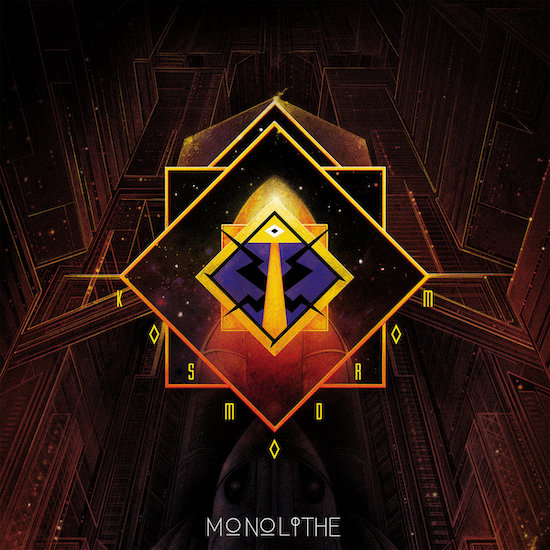
You released the album on your own. Weren’t you satisfied with the collaboration between you and Les Acteurs de l’Ombre Productions?
No, the album is released by Time Tombs Productions, which is a small new label, in co-production with Dome (our singer’s label) and MONOLITHE. We wanted to try this way of working, to see if it better suits our needs than a “regular” label. The collaboration with Les Acteurs de l’Ombre simply ended because the deal we had had came to its end. We released two albums with them and then it was time to move on.
Sylvain your previous album Okta Khora deals with sci-fi themes — what are your favourite fantastic books?
Actually, all MONOLITHE albums deal with sci-fi themes. I have read a lot of science-fiction in my life, from the golden age of science-fiction (Asimov, Clarke, Bester, Vance, Dick, etc) to the modern writers (Wilson, Watts, Robinson, Reynolds, Banks, Simmons, etc). There are too many great books written by those names only to list them all, but they’re a safe bet. I’m currently re-reading the robots series by Asimov, it’s quite outdated to some degree now but it’s a fun read.
At the same time Kosmodrom’s songs are based on topics related to the real historical Soviet cosmic program. What attracted your attention to this theme?
I have always been interested in this particular moment in history, when the USA and USSR were racing towards the stars. But what made me decide to go after this particular topic was the reading of a comic book called Laika by Nick Abadzis. It’s the story of that dog, that was sent to space and died up there from heat and stress. I wanted to create a song about it, so the rest of the album came along that way. But Kosmodrom isn’t exactly about the Soviet Space Program. It is only a background, like a metaphor. The real subject of the album is about pioneering, discovering, being the first to do something, and sometimes at all cost.
Do you mean that you built your own concept around those historical events?
I would not say that exactly, but sort of. It was a starting point. All those events have some deeper meaning; they show what mankind is capable of, the heroic attitude and the ethically questionable actions too. Take the story of Laika for example (and let’s not forget the other, unknown dogs of the program as well) which can be seen as something both heroic and cruel. But there are also a whole lot of different layers of comprehension of what happened.
The people who took care of the dogs were not heartless communist fanatics or scientists with a stone-cold determination. They were normal people with feelings too, and the loss of many of the dogs made them sad and questioning what they were doing. It’s more complicated than doing right or wrong, and these thoughts apply to everything that has happened in those days. And you can ask yourself: would Laika and the other dogs have been happier as simple stray dogs in the streets? Many of them would have died of disease or starvation. Would it have been better than being remembered as a «hero» many decades later, even if it implied death?
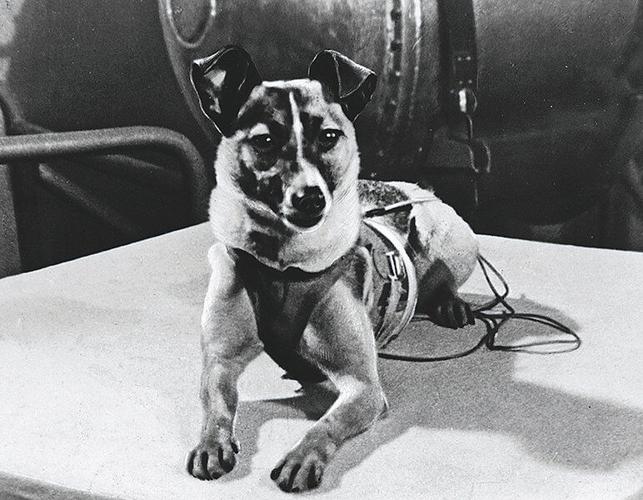
Kudryvka is the name of Laika, one of the first dogs who orbited the Earth. And I wonder, because of your in-depth approach to exploring of this story, why did you choose her tragic fate for the song’s plot?
Well as I said earlier, the story of Laika/Kudryavka is even the initial spark that led to the creation of Kosmodrom. It’s not only the actual story of that little dog though, but of all of the dogs that were used during that time and put into rockets while the scientists were doing their research. They had to learn how to maintain life up there, so a lot of dogs where sacrificed in this purpose. And of course, almost all humans are touched when evil is done to animals, especially pets like cats and dogs, as they are clueless and innocent. So, using that story as a background and starting point was a way to develop the idea of the terrible cost that is sometimes behind major steps in the development of mankind. Kudryavka is a symbol on many levels.
Russia’s reputation has dropped down due to the known events. Didn’t you want to change at least the songs’ titles to avoid negative associations?
Absolutely not. First of all, the album was written much before the “known events” started. So, it has no relationship whatsoever with it. And our music is apolitical. Kosmodrom is an artistic work, which takes inspiration from the whole of mankind’s history, from which the Soviet Space Program belongs; and as such, it is totally liberated from the current public opinion on Russia in my view. We were advised to change the titles from fear to be targeted as pro-Russians. My answer was a firm no. I don’t care if a couple of people can’t understand what we did on this album and I won’t bow to this sort of thing.
During my childhood, in the ’80s-’90s I believed that the future fate of mankind would be tightly bound with the cosmos and its conquering, but now it looks like we’re stuck in 1984 instead of… let it be Arthur C. Clarke’s The Sentinel. Do you believe that humankind still haa a chance to reach the stars?
Actually, I believed in the same thing! But yes, you are right. The future we hoped for is not around yet and instead we are rather living in a dystopia. Dystopias actually, considering that each region of the globe is stuck in its own. From place to place, you’re welcome to 1984, Fahrenheit 451, Brave New World, This Perfect Day or Stand on Zanzibar. Perhaps not to such extremes of course but not too far either. Zero Covid in China, isn’t that something that looks exactly like a dystopia that could have been written in the 1970s?
I don’t know if mankind will reach the stars someday. That would be great of course. But if it happens, I don’t see it happening in our lifetime unfortunately.
So, do you watch the news now about the endeavours of world cosmic programs, or is sci-fi the most fitting thing for you now?
Both actually. It’s not incompatible. You know, there’s a substyle of science-fiction called Hard Science. It’s still sci-fi but it lies on plausible scientific knowledge. Some of the things that are written there might happen someday, who knows. So yes, I still read science-fiction and I’m always interested in everything related to space, should it be space programs, telescope observation discoveries, and even quantic physics.
There’s the double CD special edition of Kosmodrom with an extra CD full of original covers. How did it happen that you performed these songs with such a special attitude, combining a few songs in one?
First of all, the cover album, called Kassiopea, was not really intended in the first place, but also because of covid I ended-up having a lot of time on my hands, so after finishing up the writing of Kosmodrom, I had the idea of arranging a couple of songs in what I could call the “MONOLITHE-style”. So, there’s a good mix of everything we like within the band. The mashed-up songs were done mostly to provide a different vision of those songs.
If you take for example Metallica, how many covers of “Orion” already exist? Covering that song only seemed useless, especially as you can never top the original anyway. So, the idea was to mix it with another, lesser-known, song and make something new out of it. As for the Katatonia mix of Brave, Murder, Day, the idea was to make just one song out of them and get rid of the not-so-good riffs and keep only the best parts to make a killer new track out of the originals.
Other than that, the other songs, such as “Cold”, “The Killing Moon”, “Invasion AD”, and “Special Cases”, are not metal songs in the first place so they were re-arranged to sound almost as if MONOLITHE had written them.
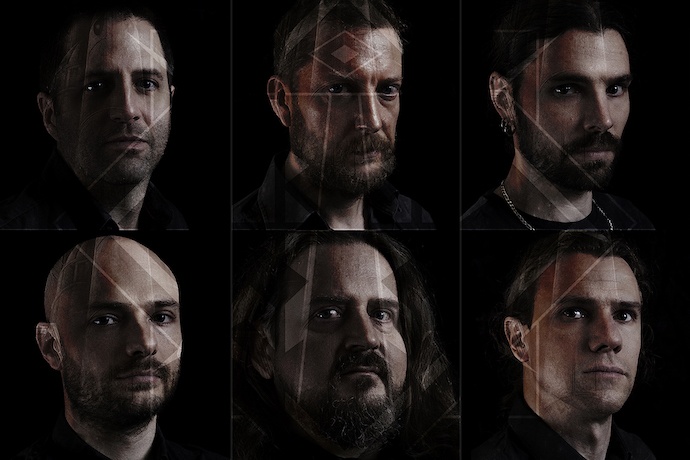
Did you ever receive negative feedback because of the stylistic changes you’ve performed through Monolithe? I wonder because Ahab (who started with funeral doom positions too) is releasing a new album and I remember that there were critics towards their evolution on the previous record.
Yes, of course we did. Whatever you do, you will always get negative feedbacks. You change? That makes some people complain. You don’t change? That makes some people complain.
The best attitude is to just not care. MONOLITHE does what MONOLITHE wants to do, and that’s it. But the good thing for us is that, being an underground band and all, there is not so much negativity around us. Really famous bands have to go through this shit all the time, especially in the internet age, but honestly, in our situation, the feedback we get is mostly positive. We also still play the old stuff live, so I guess that makes everyone happy.
You say what Monolithe does what Monolithe wanst to do. What did Monolithe want to do in recording Kosmodrom?
Well, besides telling the tale I was talking about earlier, on a musical level the idea was to mix the different sides of the music the band has done over its career and use it as a starting point to develop our sound even further.
Kosmodrom is an album on which you’ll find the music that is the closest to our roots with a song such as “Kosmonavt”, which is close to what we did with Monolithe I and Monolithe II, and music that is in the continuity of what we had started with Nebula Septem back in 2018. And furthermore, there are a couple of things we have never done before as well. Every album is a step forward to me, and at the same time I like to keep all the elements that make our identity what it is, everything that has shaped our sound and that should never go away.
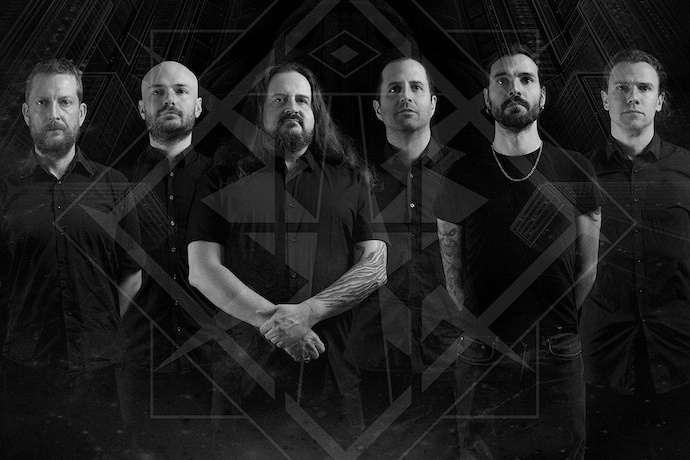
The band met its twentieth anniversary in 2021, how did you celebrate it?
We didn’t. That covid stuff, again. We actually had a special project in mind, but we simply couldn’t do it. Perhaps another time.
We released a box in 2022, though. That could be taken as a celebration of the longevity of the band. That box, called The Great Clockmaker, is a re-issue of The Great Clockmaker saga, meaning the first four albums and the Monolithe Zero compilation. It is a beautiful box with new artwork, and there is a wooden version and a cardboard version.
Kosmodrom was already recorded in 2021… does this mean that you already have some material for the next album?
Not really. After Okta Khora was released, I wanted to pause a little bit from writing new music. Take my time, get fresh ideas. But covid, again, changed those plans and here came Kosmodrom.
I have some riffs here and there, but nothing really structured at the moment. There’s no hurry, no need to rush into the next record, it will come when it comes, and it might take a little longer to get out this time, as I need a little rest haha.
What are your plans for Monolithe’s nearby future?
The band is focusing on playing live at the moment, and trying to concentrate on playing in France mostly, as we realized we neglected our own country for many years. That doesn’t mean we won’t play elsewhere whenever good opportunities show-up. So, we hope to get some nice gigs booked in 2023. We played two good shows in Paris and Rotterdam lately and we’d like to have more of it!
Thank you for the enlightening interview Sylvain! I wish you all the best with promoting Monolithe’s message further. How would you like to finish our conversation?
Thank you for the interview and support over the years, Aleks. For you and all Russian folks out there, there is a little surprise at the end of “Kosmonavt”, after the 30 seconds of silence once the song is finished. Our Russians friends liked it very much, I hope it will be the same for everyone.
https://monolithe.bandcamp.com/
https://www.facebook.com/monolithedoom
